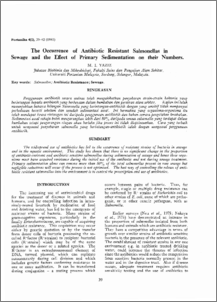Citation
Yaziz, Mohammad Ismail
(1981)
The occurrence of antibiotic resistant Salmonellas in
sewage and the effect of primary sedimentation on their numbers.
Pertanika, 4 (1).
pp. 39-42.
ISSN 0126-6128
Abstract
The widespread use of antibiotics has led to the occurrence of resistant strains of bacteria in sewage
and in the aquatic environment. This study has shown that there is no significant change in the proportion
of antibiotic-resistant and antibiotic sensitive salmonellas during sedimentation of sewage and hence these organisms
must have acquil·ed resistance during the initial use of the antibiotic and not during sewage treatment.
Primary sedimentation alone can remove more than 80% of the total salmonellas present in raw sewage but
negligible reductions will occur if the process is not optimised. The best way of controlling the release of antibiotic
resistant salmonellas into the environment is to control the prescription and use of antibiotics.
Download File
![[img]](http://psasir.upm.edu.my/style/images/fileicons/application_pdf.png)  Preview |
|
PDF
The_Occurrence_of_Antibiotic_Resistant_Salmonellas_in.pdf
Download (1MB)
|
|
Additional Metadata
Actions (login required)
 |
View Item |

